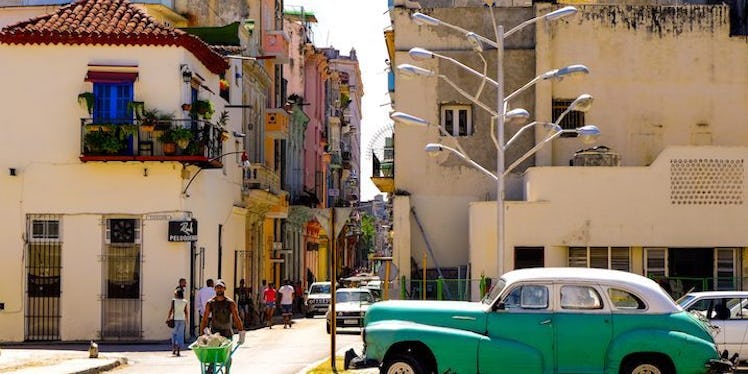There's a baffling health epidemic plaguing U.S. embassy staffers in Cuba, and the whole situation is very mysterious. Almost two dozen American diplomats are suffering from a slew of identical health conditions, including hearing loss and memory issues. As a result, U.S. officials are fleeing the country, and the State Department is suspending the processing of U.S. visa applications in Cuba.
On Sept. 29, the State Department announced that more than half of nonemergency American embassy workers in Havana will be sent back stateside. The decision was made after 21 staffers reported experiencing the same symptoms, including dizziness, tinnitus, headache, and fatigue. While no embassy members have spoken out publicly about their ailments, NBC News reported that one anonymous diplomat thought that something very fishy is going on. The source said,
We have injured people who still have no real information as to what to do medically and a web of half-truths and outright lies. No one political party or administration is innocent in this. This has taught me that once faith is broken it's very difficult to believe again. I don't believe any more.
John Caulfield, former chief of U.S. Interests Section in Havana, added that the health problems were swift and lasting. He told NBC News,
This person's spouse noted that the person was turning up the volume of the TV and radio very high and it was irritating and the spouse said you need to get your hearing checked. They went to the doctor, who said 'You have permanent hearing loss, you need a hearing aid.
Despite an investigation conducted by the F.B.I., there hasn't been any conclusive information about the cause, though, according to The New York Times, experts warn that "sonic weapon or faulty surveillance device" might be to blame.
Secretary of State Rex Tillerson was quick to emphasize that the United States and Cuba will continue to "maintain diplomatic relations." He said in a statement,
The decision to reduce our diplomatic presence in Havana was made to ensure the safety of our personnel. Our work in Cuba continues to be guided by the national security and foreign policy interests of the United States. Cuba has told us it will continue to investigate these attacks and we will continue to cooperate with them in this effort.
The State Department announced that it will not be cutting the number of Cuban diplomats in Washington – a decision, Senator Marco Rubio (R-FL) tweeted, was inherently unfair.
Senator Patrick Leahy (D-VT) seconded Rubio's sentiment, saying that it appears some sort of foul play went down.
“Whoever is doing this obviously is trying to disrupt the normalization process between the United States and Cuba,” Leahy told The New York Times. “Someone or some government is trying to reverse that process.
Last week, five GOP senators sent a letter to Tillerson asking that he classify Cuban diplomats in the U.S. as persona non grata until the Cuban government takes "tangible action" regarding the health attacks. Thus far, though, the Cuban government has denied any allegations, saying in a statement on Sept. 26,
Cuba has never perpetrated nor will it ever perpetrate actions of this nature, and has never permitted nor will it ever permit any third-party use of its territory for this purpose.
This mysterious epidemic is going to affect travel as well.
As of Sept. 29, the United States has put a halt on issuing U.S. visas in Cuba, a decision that Cuban diplomat Josefina Vidal deemed "hasty." During a briefing with the Cuban press on Sept. 29, Vidal said,
We consider that the decision announced by the State Department is hasty and will affect bilateral relations, in particular, cooperation on issues of mutual interest and exchanges of a different nature between the two countries.
Here's hoping this whole mysterious health epidemic is solved very, very quickly.
